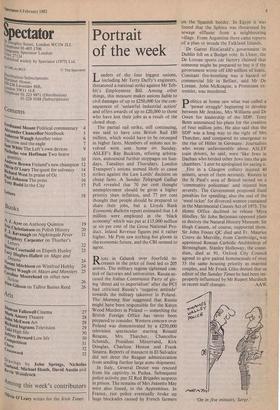Portrait of the week
Leaders of the four biggest unions, including Mr Terry Duffy's engineers, threatened a national strike against Mr Teb- bit's Employment Bill. Among other things, this measure makes unions liable to civil damages of up to £250,000 for the con- sequences of 'unlawful industrial action' and offers awards of up to £20,000 to those who have lost their jobs as a result of the closed shop.
The partial rail strike, still continuing, was said to have cost British Rail £80 million, which would have to be recouped in higher fares. Members of unions not in- volved were sent home on Sunday. ASLEF's Ray Buckton, refusing arbitra- tion, announced further stoppages on Sun- days, Tuesdays and Thursdays. London Transport's unions seemed likely to cause strikes against the Law Lords' decision on cheap fares. A Sunday Telegraph Gallup Poll revealed that 70 per cent thought unemployment should be given a higher priority than inflation, and 77 per cent thought that people should be prepared to share their jobs, but a Lloyds Bank Economic Bulletin report estimated that 1.6 million were employed in the 'black economy' which was put at £15,000 million or six per cent of the Gross National Pro- duct. Inland Revenue figures put it rather higher. Mr Pym saw nothing but gloom in the economic future, and the CBI seemed to agree.
Riots in Gdansk over fourfold in- creases in the price of food led to 205 arrests. The military regime tightened con- trol of factories and universities. Russia ac- cused the Italian Communist Party of giv- ing 'direct aid to imperialism' after the PCI had criticised Russia's 'negative attitude' towards the military takeover in Poland. The Morning Star suggested that Russia might have been responsible for the Katyn Wood Murders in Poland — something the British Foreign Office has never been prepared to consider. Western concern over Poland was demonstrated by a £250,000 television spectacular starring Ronald Reagan, Mrs Thatcher, Chancellor Schmidt, President Mitterrand, Kirk Douglas, Charlton Heston and Frank Sinatra. Reports of massacre in El Salvador did not deter the Reagan administration from sending further large arms shipments.
In Italy, General Dozier was rescued from his captivity in Padua. Subsequent police activity put 32 Red Brigades suspects in prison. The remains of Mrs Jeanette May were also found, in the Appennines. In France, riot police eventually broke up huge blockades caused by French farmers on the Spanish border. In Egypt it was found that the Sphinx was threatened by sewage effluent from a neighbouring village. From Argentina there came reports of a plan to invade the Falkland Islands.
Dr Garret FitzGerald's government in Dublin fell on a Budget vote. In Ulster, the De Lorean sports car factory claimed that someone might be prepared to buy it if the government wrote off £80 million of loans. Constant fire-bombing was a hazard of commercial life in Belfast, said Mr De Lorean. John McKeague, a Protestant ex- tremist, was murdered.
Politics at home saw what was called a 1 'power struggle' beginning to develop between Mr Jenkins, Mrs Williams and Dr Owen for leadership of the SDP. Tony Benn announced his plans for the creation of four million jobs. He also said that the SDP was a long way to the right of Mrs Thatcher, and compared its emergence to the rise of Hitler in Germany. Journalists who wrote unfavourably about ASLEF train drivers, he said, were 'like Jews in Dachau who herded other Jews into the gas chambers.' Later he apologised for saying it.
Fire in a Glasgow colliery injured 40 miners, seven of them seriously. Rioters in the St Paul's area of Bristol turned on a `community policeman' and injured him severely. The Government proposed fixed penalties for speeding; also the end of the `meal ticket' for divorced women contained in the Matrimonial Causes Act of 1973. The Home Office declined to release Myra Hindley. Sir John Betjeman opposed plans to destroy the Natural History Museum. Sir Hugh Casson, of course, supported them. Sir John Foster QC died and Fr. Maurice Couve de Murville, from Cambridge„ was appointed Roman Catholic Archbishop of Birmingham. Stanley Holloway, the come- dian, died at 91. Oxford City Council agreed to give paired homosexuals of over 35 the same housing priority as married couples, and Mr Frank Giles denied that as editor of the Sunday Times he had been im- properly influenced by Mr Rupert Murdoch
in recent staff changes. AAW
'On in five minutes, Serge.'
























 Previous page
Previous page